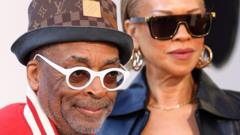A recent court ruling has barred Tidjane Thiam from the Ivorian presidential election, raising concerns about democracy and identity politics in the country.**
Political Setbacks in Ivory Coast: A Challenge to Democratic Aspirations**

Political Setbacks in Ivory Coast: A Challenge to Democratic Aspirations**
The obstacles faced by Tidjane Thiam highlight the complicated intersection of nationality and politics in Ivory Coast as the election nears.**
Even seasoned professionals from the international business arena can find themselves unprepared for the complexities of local politics in Ivory Coast. This hard truth is underscored by the current plight of Tidjane Thiam, who is caught in a political quagmire that questions the legitimacy of the country's democratic processes. Once seen as a promising candidate for the presidency, Thiam now faces exclusion due to a court ruling which determined that his prior acquisition of French citizenship resulted in the loss of his Ivorian nationality.
Thiam's return to the Ivorian political landscape in 2022 was met with optimism—he had previously established a successful career in global finance and was poised to step into the political arena as a candidate to succeed the aging president Alassane Ouattara, who, at 83, is wrapping up his third term. A member of a noble family and related to a beloved national figure, Thiam's political comeback was anticipated as a progressive force following the death of a key opposition leader earlier in the year.
However, following a pivotal court decision, his path to candidacy was abruptly halted. The ruling stated that Thiam, having not renounced his French citizenship in time, lost his right to Ivorian nationality, disqualifying him from the upcoming presidential election—an exclusionary tactic that mirrors historical political strife rooted in identity-based laws that have plagued Ivory Coast for decades. With a political landscape already diminished by past convictions against other opposition leaders, the implications of Thiam's disqualification resonate deeply, suggesting a weakening of pluralism and political diversity.
The broader context shows a tenuous relationship between power and citizenship in West Africa. In recent years, military coups in neighboring countries have created a space where political disenchantment has become prevalent, especially among the youth—a demographic that overwhelmingly supports change. While other nations within the region have managed peaceful transitions through elections, the erosion of political competition in Ivory Coast threatens its status as a regional anchor of stability and progress.
Economically, Ivory Coast remains robust, with its continual growth setting a benchmark in the CFA franc zone and beyond, making it fraught with potential yet also susceptible to discontent. The ongoing saga of Thiam exemplifies how legal frameworks can inadvertently hinder democratic ideals, leaving citizens questioning the very nature of "Ivorian-ness."
Moving forward, Thiam's team is engaged in a battle of public perception and political negotiation, seeking pathways to re-enter the electoral race. Meanwhile, the future of the Ivorian political landscape remains uncertain as the country grapples not only with its internal political dynamics but also with the legacy of its historical conflicts. As the presidential election approaches, the question of how Ivory Coast will navigate its identity and democratic aspirations hangs in the balance.


















